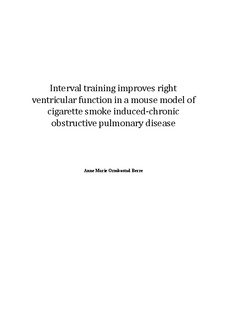Interval training improves right ventricular function in a mouse model of cigarette smoke induced-chronic obstructive pulmonary disease
Master thesis
Permanent lenke
http://hdl.handle.net/11250/264915Utgivelsesdato
2014Metadata
Vis full innførselSamlinger
Sammendrag
Patients with chronic obstructive pulmonary disease (COPD) have impaired lung function and exercise tolerance reducing their quality of life and increasing mortality. In recent years, there has been a growing consensus that exercise has beneficial effects for COPD patients, even for those with severely impaired pulmonary function. Even though COPD primarily affects the lungs, it has several systemic comorbid conditions including cardiac dysfunction with right sided heart failure, which is an adverse prognostic factor in COPD. While several clinical studies have investigated the relationship between exercise and COPD and found that exercise increases muscular strength and quality of life in these patients, there are limited data regarding the effect of exercise training on their cardiac function.
Objective: To study whether interval training would improve cardiac function in a mice model of COPD.
Method: 42 mice were randomized into cigarette smoke (CS) exposure or fresh air (FA) group. Following 14 weeks of CS and FA exposure, the two groups were again randomized into exercise training or sedentary group. The training group exercised one hour every day, five times a week for four weeks. Cardiac function was assessed by echocardiography.
Results: In the CS exposed animals, delta peak oxygen uptake increased by 9.2% in CS and by 11 % in FA trained animals. Right ventricular (RV) systolic function was depressed by CS. Four weeks of interval training restored the depressed function of RV, while no changes were observed in the left ventricle function.
Conclusion: Taken together, results from the present study support the hypothesis that CS decreased RV function and that the adaptations to interval training exercise were accompanied by enhanced systolic and diastolic RV global function. A reduction in vascular remodeling was suggested in the present study as a potential mechanism in which exercise training reduces RV afterload and dysfunction.
